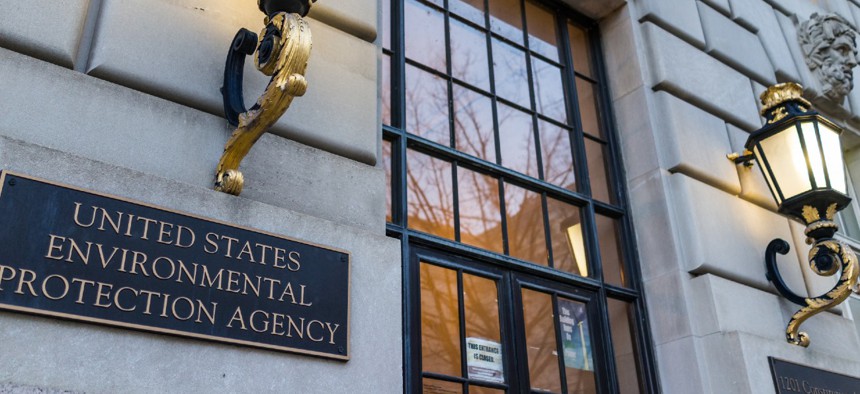
krblokhin / iStock.com
EPA Begins Rolling Back Trump-era Union Policies
The Environmental Protection Agency and the American Federation of Government Employees will revert in part to their previous 2007 contract, and the parties will begin negotiations on an entirely new contract later this year.
The Environmental Protection Agency this week moved to implement President Biden’s workforce executive order, working with its union to roll back to a 2007 contract until the parties can negotiate a new agreement.
Last year, EPA implemented a new union contract on the American Federation of Government Employees, following a largely pro-management decision from the Federal Service Impasses Panel. Among other things, the agreement severely reduced union officials’ access to official time, restricted what matters could be the subject of grievance proceedings and gave management more leeway on employee performance evaluations. It also denied the union access to agency office space and supplies.
Those provisions were the result of a trio of executive orders signed by former President Trump in 2018 aimed at reducing the influence of unions across the federal government.
In January, Biden signed an executive order rescinding those orders, as well as several other edicts that he deemed to be anti-federal employee. Last month, the Office of Personnel Management issued guidance instructing agencies to reopen union contracts that contain the provisions of Trump’s workforce executive orders for renegotiation, and to temporarily revert to pre-Trump labor agreements in the meantime.
According to a memorandum of understanding between EPA and AFGE, the union and agency will revert to their previous 2007 contract on matters pertaining to official time, grievance procedures, office space and performance evaluations.
On official time, the agreement also ensures that local union officials receive official time in accordance with pre-Trump executive order practices established on a region-by-region basis.
“Council officials will continue to receive reasonable and necessary official time,” the document states. “This means that local officials will follow MOUs related to the amount of official time. Local officials will be granted official time that was in effect pursuant to MOUs prior to July 2019.”
The deal restores access to the agency facilities, particularly office space and supplies. And it partially reinstates the policies on employee evaluations that was in effect as part of the 2007 contract between EPA and AFGE. The parties also agreed that for management to put an employee on a performance improvement plan, the agency must have “justification” first.
“The parties agree that effective April 7, 2021, Article 34 (Employee Performance Evaluation) from the 2007 agreement will replace the 2020 MOU bargained between the parties regarding performance, except that there will continue to be a 3-tier performance appraisal system until the parties address this issue in term bargaining,” the agreement states. “Both parties reserve the right to bargain performance at the term.”
One area where the parties will not revert to the 2007 agreement is on telework and work schedules. The 2020 contract’s article on telework will remain in effect, except its requirement of the number of days spent in the office “will be delinked” from the number of days per week that employees may work remotely. The parties indicated they will further discuss telework and alternate work schedules during term negotiations.
The memo sets up a two-week review period for management and AFGE to review the rest of the 2007 contract for provisions they would like to see implemented moving forward, and negotiations on a new collective bargaining agreement will commence within 90 days of the end of that review.
EPA and AFGE also agreed to conduct joint training on collective bargaining, with an eye to repairing the labor-management relationship at the agency.
“This training includes but is not limited to training on interest-based bargaining, relationship building, permissive bargaining and any other training the parties agree is appropriate,” the document states. “[The] parties agree to pursue partnership opportunities that enhance working conditions of EPA employees and further our collaborative efforts toward improving the labor-management relationship.”
In a statement, AFGE Council 238 President Gary Morton applauded the agreement, and was hopeful it will portend a more positive relationship between his union and the EPA.
“This interim agreement restores employees’ right to full representation at the worksite and will make it possible for employees through their union representatives to resolve any issues they encounter,” Morton said. “This is a huge step in the right direction, and the union won’t stop fighting until we eliminate all of the anti-labor provisions forced on us by the previous administration.”







